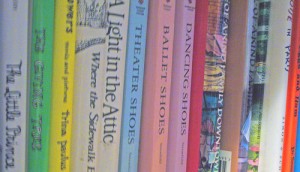-
Shakespeare? What a Good-for-Nothing!
A recent WaPo blog post, “Why Kids Hate School, Subject by Subject,” eviscerated the most common, core subject areas taught in high school, labeling almost all of them pretty much useless for students.
My favorite subject, language arts, got a bit of a pass, with the author saying that it should focus solely on writing- that is, producing students who can manage a written argument. The author gave the thumbs down to all the rest of the activities that we’re accustomed to finding in the typical English class: reading, reporting on our reading, and so on. Here’s the paragraph:
“There is exactly one thing worth paying attention to in English. Not Dickens (unless of course you like Dickens.) Not Moby Dick, or Tennyson, or Hawthorne, or Shakespeare (unless of course, you like reading them.) What matters is learning how to write well. A good English teacher would give you daily writing assignments and help you get better at writing (and speaking). By writing assignments I don’t mean term papers. I mean writing about things you care about and learning to defend your arguments. Learning to enjoy reading matters as well but that would mean picking your own books to read and not having to write a book report. Lots of luck with that.
The issue with this, though, is that reading the classics- putting that data into the developing brain- is going to help produce good writers.
I know this.
I devoured books as a student, and I know that the ability to pull and write phrasing quickly, to arrange words and sentences in an 1) aesthetic and/or 2) informative manner is directly the result of mass amounts of data being entered into my conscience/thought process/brain as a student.
My work is patterned after every piece of writing that I’ve read and digested. Even the finicky grammar rules are directly from reading. I know where to put a semi-colon- perhaps the most confusing piece of punctuation to the layperson- because I can hear what it sounds like when a semi-colon is supposed to be there. And I can hear it because X novels have done it, and done it well, and that accumulated sound is well-rooted in my head.
The author of the WaPo blog doesn’t dismiss reading entirely. But he insists that students should focus only on what they want to read. I understand this to a point, but have you SEEN what kids WANT to read?
This brings up an additional point: Can reading bad language therefore do the opposite? I’m not sure. I think the answer may be different for an established writer, or even for an adult in general. But, would I want my students or my children filling their head with sub-par writing day after day and year after year? No way.
A last thought. The input/data needs to continue. Today, I do a lot of reading and writing online. And I know that 75% of the time, I’m looking for manageable bites of information. Tell me your point, tell me why, get to it, quickly. See, that’s more data for me. I sort online reading into “good” and “eh,” and then I reference that when I’m doing my own writing. The data input has to continue.
ETA: No, reading alone won’t make good writing. Yes, one has to DO to write. Think of it like a tool- an essential tool.







PS- Can I maybe convince you to subscribe while you’re here? It’s just one roll up on your handy-dandy mouse. My RSS feed changed, and I’m feeling pretty lonely. 🙁